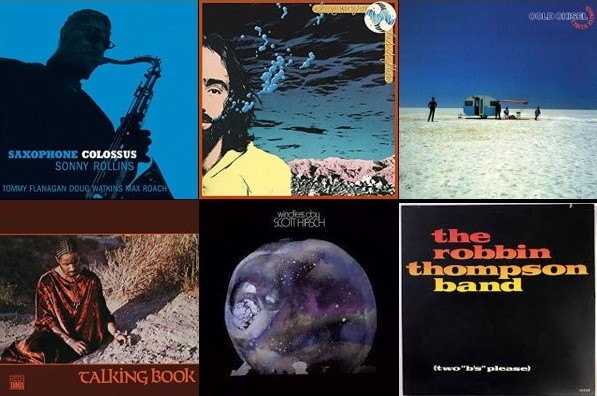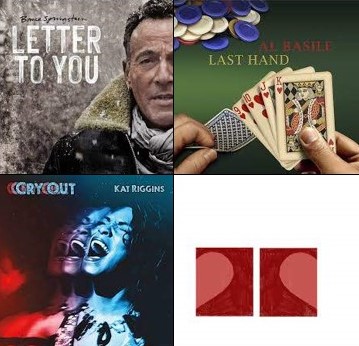Happy Sunday and I hope everybody is feeling groovy. After having put together music time travel itineraries for just over three years, I thought this would be a good moment to step back temporarily and let others pick the six stops for today’s trip. I’ll remain your conductor, and we will still hit six different decades with music in different flavors, so hop on board, fasten your seatbelts, and let’s have some fun!
Sonny Rollins/I’m an Old Cowhand
Jazz aficionado CB, aka. Cincinnati Babyhead was kind enough to take a break from fishing to determine our first stop: Way Out West, a 1957 album by jazz tenor saxophone great Sonny Rollins. Over an incredible 70-year-plus career, Rollins has recorded more than 60 albums as a leader and appeared on many additional records as a sideman. He has played with the likes of Charlie Parker, Miles Davis, Dizzy Gillespie, Thelonious Monk, Max Roach and Modern Jazz Quartet. Off the above mentioned album, here’s I’m an Old Cowhand, a comic song written by Johnny Mercer for the Western musical picture Rhythm on the Range and released as a single in 1936 by its star Bing Crosby. Rollins who is now 93 and retired was backed by Ray Brown (bass) and Shelly Manne (drums).
Ozzy Osbourne/Bark At the Moon
Next we’re pushing the pedal to the metal and zip to November 1983, which saw the release of Ozzy Osbourne’s third solo album Bark At the Moon. Can you guess who might have suggested the destination, or should it have been distortion? Of course, our resident heavy metal expert Deke from deKe’s Vinyl Reviews & More…, who also hosts The Distortion Den on YouTube, together with Jex. Bark At the Moon marked the ex-Black Sabbath lead vocalist’s change to a more a synth infused pop-metal sound. Listeners evidently didn’t mind, especially in the U.S. where the album secured 3X Platinum certification (3 million certified sold units). Here’s fiery title song and first single, which like all of the album’s other tracks officially were credited to Ozzy only – melodic kickass rocker that makes it very accessible – ha ha ha ha!
Rough Cats/So Alone
Time to take a bit of a breather by traveling back to the present with the latest single by Rough Cats, a group around Aussie singer-songwriter and multi-instrumentalist Brad McClean, aka. Slap Cat. They say their music spans multiple genres with lyrics injecting doses of cynicism, observation and humor. While official information on Rough Cats may be a bit ambiguous, I can say with no uncertainty that I dig So Alone, a great suggestion from fellow music blogger and accomplished and published poet Lisa at Tao Talk. The single came out on December 8, 2023.
Traffic/Dear Mr. Fantasy
Time to pay a visit to the ’60s with a wonderful stop proposed by Max who pens the terrific PowerPop blog and whose sentiments about music are so similar to mine that I’m still convinced we somehow are distant relatives! When English rock band Traffic released their December 1967 debut album Mr. Fantasy, the multi-instrumentalists and vocalists were still in their original line-up of Chris Wood, Steve Winwood, Dave Mason and Jim Capaldi. With Dear Mr. Fantasy, Max shockingly one of my all-time favorite songs, co-written by Capaldi, Winwood and Wood.
Bobby Caldwell/What You Won’t Do For Love
Our next stop takes us to the ’70s and a proposition from an expert for that decade, Paul, one of the creators of the fun Once Upon a Time in the ’70s blog. When he told me to feature Bobby Caldwell’s What You Won’t Do For Love, a title I didn’t recall, I immediately knew we had a smooth-sounding winner once I started listening. Co-written by Caldwell and Alfons Kettner, the track was the lead single of Caldwell’s 1978 eponymous debut album and became his signature song. Active between 1968 and 2020, the American singer-songwriter and musician spanned various genres, including R&B, soul, jazz and adult contemporary. Caldwell passed away in March 2023 at the age of 71.
The Bluetones/Slight Return
For our sixth and final stop today, I turned to Dave from A Sound Day, where he chronicles and celebrates great music. He also is the fearless host of Turntable Talk, for which he invites fellow bloggers to share their thoughts on topics he proposes. Dave picked Slight Return by The Bluetones, a British melodic guitar pop group I hadn’t heard of before. For this, we shall set our time controls to February 1996 and their debut album Expecting to Fly. Slight Return, credited to all four members – Mark Morriss (vocals), Adam Devlin (guitar), Scott Morriss (bass, backing vocals) and Eds Chesters (drums, percussion) – also became the album’s second single and their highest-charting in the UK, peaking at no. 2 after it had been reissued – lovely sounding power pop and a great way to finish yet another music time travel excursion.
I’d like to thank CB, Deke, Lisa, Max, Paul and Dave for their great itinerary suggestions. This was fun and I may harass you again sometime in the future! 🙂
For now, here’s a Spotify list of all the above goodies. See ya!
Sources: Wikipedia; YouTube; Spotify









